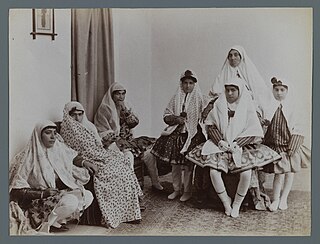
Sex trafficking is human trafficking for the purpose of sexual exploitation. It has been called a form of modern slavery because of the way victims are forced into sexual acts non-consensually, in a form of sexual slavery. Perpetrators of the crime are called sex traffickers or pimps—people who manipulate victims to engage in various forms of commercial sex with paying customers. Sex traffickers use force, fraud, and coercion as they recruit, transport, and provide their victims as prostitutes. Sometimes victims are brought into a situation of dependency on their trafficker(s), financially or emotionally. Every aspect of sex trafficking is considered a crime, from acquisition to transportation and exploitation of victims. This includes any sexual exploitation of adults or minors, including child sex tourism (CST) and domestic minor sex trafficking (DMST).

The continent of Africa is one of the regions most rife with contemporary slavery. Slavery in Africa has a long history, within Africa since before historical records, but intensifying with the trans-Saharan and Indian Ocean slave trade and again with the trans-Atlantic slave trade; the demand for slaves created an entire series of kingdoms which existed in a state of perpetual warfare in order to generate the prisoners of war necessary for the lucrative export of slaves. These patterns persisted into the colonial period during the late 19th and early 20th century. Although the colonial authorities attempted to suppress slavery from about 1900, this had very limited success, and after decolonization, slavery continues in many parts of Africa despite being technically illegal.

Contemporary slavery, also sometimes known as modern slavery or neo-slavery, refers to institutional slavery that continues to occur in present-day society. Estimates of the number of enslaved people today range from around 38 million to 49.6 million, depending on the method used to form the estimate and the definition of slavery being used. The estimated number of enslaved people is debated, as there is no universally agreed definition of modern slavery; those in slavery are often difficult to identify, and adequate statistics are often not available.

Human trafficking is the trade of humans for the purpose of forced labour, sexual slavery, or commercial sexual exploitation.

Human trafficking in Australia is illegal under Divisions 270 and 271 of the Criminal Code (Cth). In September 2005, Australia ratified the Protocol to Prevent, Suppress and Punish Trafficking in Persons, especially Women and Children, which supplemented the United Nations Convention against Transnational Organized Crime. Amendments to the Criminal Code were made in 2005 to implement the Protocol.
Coalition to Abolish Slavery and Trafficking (CAST) is a Los Angeles-based anti-human trafficking organization. Through legal, social, and advocacy services, CAST helps rehabilitate survivors of human trafficking, raises awareness, and affects legislation and public policy surrounding human trafficking.

In the United States, human trafficking tends to occur around international travel hubs with large immigrant populations, notably in California, Texas, and Georgia. Those trafficked include young children, teenagers, men, and women; victims can be domestic citizens or foreign nationals.

Siddharth Kara is an Indian author. He is a Pulitzer Prize finalist, a British Academy Global Professor, and an associate professor at the University of Nottingham. He is best known for his book "Cobalt Red: How the Blood of the Congo Powers Our Lives" (2023). He has also published a trilogy on modern slavery: Sex Trafficking: Inside the Business of Modern Slavery (2009), Bonded Labor: Tackling the System of Slavery in South Asia (2012), and Modern Slavery: A Global Perspective (2017).
Egypt ratified the 2000 UN TIP Protocol in March 2004.

Nefarious: Merchant of Souls is a 2011 American documentary film about modern human trafficking, specifically sexual slavery. Presented from a Christian worldview, Nefarious covers human trafficking in the United States, Western and Eastern Europe, and Southeast Asia, alternating interviews with re-enactments. Victims of trafficking talk about having been the objects of physical abuse and attempted murder. Several former prostitutes talk about their conversion to Christianity, escape from sexual oppression, and subsequent education or marriage. The film ends with the assertion that only Jesus can completely heal people from the horrors of sexual slavery.

Not My Life is a 2011 American independent documentary film about human trafficking and contemporary slavery. The film was written, produced, and directed by Robert Bilheimer, who had been asked to make the film by Antonio Maria Costa, executive director of the United Nations Office on Drugs and Crime. Bilheimer planned Not My Life as the second installment in a trilogy, the first being A Closer Walk and the third being the unproduced Take Me Home. The title Not My Life came from a June 2009 interview with Molly Melching, founder of Tostan, who said that many people deny the reality of contemporary slavery because it is an uncomfortable truth, saying, "No, this is not my life."
Hope for Justice is a global non-profit organisation which aims to end human trafficking and modern slavery. It is active in the United Kingdom, United States, Cambodia, Norway, Australia, Ethiopia and Uganda and has its headquarters in Manchester, England.

Slavery is a system which requires workers to work against their will for little to no compensation. In modern-day terms, this practice is more widely referred to as human trafficking. Human trafficking is defined by the United Nations Office on Drugs and Crime as “the recruitment, transportation, transfer, harboring or receipt of persons, by means of the threat or use of force or other forms of coercion, of abduction, of fraud, of deception, of the abuse of power or of a position of vulnerability or of the giving or receiving of payments or benefits to achieve the consent of a person having control over another person, for the purpose of exploitation”. The practices of slavery and human trafficking are still prevalent in modern America with estimated 17,500 foreign nationals and 400,000 Americans being trafficked into and within the United States every year with 80% of those being women and children. Human trafficking in the United States can be divided into the two major categories of labor and sex trafficking, with sex trafficking accounting for a majority of cases.

Human trafficking in New York is the illegal trade of human beings for the purposes of reproductive slavery, commercial sexual exploitation, and forced labor. It occurs in the state of New York and is widely recognized as a modern-day form of slavery. It includes, "the recruitment, transportation, transfer, harboring or receipt of persons by means of threat or use of force or other forms of coercion, of abduction, of fraud, of deception, of the abuse of power, or of a position of vulnerability or of the giving or receiving of payments or benefits to achieve the consent of a person having control over another person, for the purpose of exploitation. Exploitation shall include, at a minimum, the exploitation of the prostitution of others or other forms of sexual exploitation, forced labor services, slavery or practices similar to slavery, servitude or the removal of organs."

Human trafficking in Virginia is the illegal trade of human beings for the purposes of reproductive slavery, commercial sexual exploitation, or forced labor as it occurs in the state of Virginia, and it is widely recognized as a modern-day form of slavery. It includes "the recruitment, transportation, transfer, harboring or receipt of persons by means of threat or use of force or other forms of coercion, of abduction, of fraud, of deception, of the abuse of power, or of a position of vulnerability or of the giving or receiving of payments or benefits to achieve the consent of a person having control over another person, for the purpose of exploitation. Exploitation shall include, at a minimum, the exploitation of prostitution of others or other forms of sexual exploitation, forced labor services, slavery or practices similar to slavery, servitude or the removal of organs."

Missing Link Trust is a nonprofit organization that uses art and educational campaigns to raise awareness and prevent child sex trafficking. Their work includes public sculpture installations, stencil campaigns, the interactive video game Missing: Game for a Cause, and the interactive online comic Web of Deceit - A missing and trafficking casefile. The organization was awarded the 2021 Stop Slavery Campaigns Award from the Thomson Reuters Foundation.
Kate Garbers is a founder and former managing director of the Bristol, UK-based anti-slavery organisation and charity Unseen. She has developed projects to support survivors of slavery, and assists and advises survivors. She also works with law enforcement agencies and governments on how to tackle trafficking, including contributing to the Modern Slavery Act 2015 and the National Referral Mechanism Review.

Concubinage in the Muslim world was the practice of Muslim men entering into intimate relationships without marriage, with enslaved women, though in rare, exceptional cases, sometimes with free women. If the concubine gave birth to a child, she attained a higher status known as umm al-walad.







